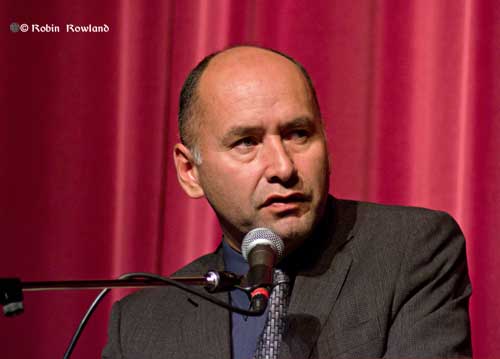Energy Politics First Nations
In a news release posted on the Aboriginal Women’s Action Network Facebook page, 13 Wet’suwet’en chiefs are criticizing what they call “divide and conquer strategies’ of industry and government” in advocating the Enbridge Northern Gateway Pipeline. The reference is the signing Friday of an agreement with Enbridge by Elmer Derrick of the Gitxsan Nation, an action denounced by other Gitxsan people.
United We Shall Win the Battle against Enbridge
Moricetown, British Columbia
The
Wet’suwet’en feel compelled to address our many friends and supporters
in the fight to resist the pressures of the tar sands. It comes as no
surprise to us that the money of the oil barons is being used to drive a
wedge between the Nations who stand united in opposition to the
Northern Gateway pipeline.
“We are very familiar with the
‘divide and conquer strategies’ of industry and governments but we stand
firm in resisting these pressures”, says Chief Kloum’Khun. “There is a
lot at stake in this fight. From First Nations in the
Athabascan/Mackenzie watershed who are suffering from the chronic
consequences of tar sands development out to BC coast with the threat of
oil tankers through the waters of Coastal First nations.”
Wet’suwet’en
territory encompasses the headwaters of the Fraser watershed and major
tributaries of the Skeena watershed (Morice/Bulkley River) and feed BC’s
most vibrant salmon fisheries. Enbridge’s proposed pipeline route will
rip the heart out of our traditional lands and place our functioning
ecosystems in dire peril.
Chief Na’moks says, “This pipeline
proposal does not meet the need of current and future Wet’suwet’en
people. This decision was made through a series of clan meetings held
with Wet’suwet’en people using our traditional laws. Today we continue
to stand firm in our opposition to Enbridge.”
“For the Wet’suwet’en, we will not risk our culture and livelihood for a few petro dollars.”
Regarding,
the internal conflict currently being experience by our Gitxsan
cousins, we feel deeply. We remain committed to continued collaboration
in our fight against the Enbridge tar sands pipeline. This is merely the
beginning of a lengthy fight and collectively we must remain steadfast,
and honourable and stay the course.
The Wet’suwet’en have
a history of collaboration. We jointly worked with the Gitxsan Chiefs
in the historic Delgamuukw/Gisdayway court case. We supported the
Tsilhqot’in First Nation’s fight against the Prosperity Mine proposal
and the destruction of Fish Lake. We are supporting the Tahltan First
Nation in their opposition to Royal Dutch Shell’s attempt to develop
coalbed methane in the Sacred Headwaters. We are interveners in the
Hul’qumi’num petition to the Inter-American Petition on Human Rights.
UNITY ABOVE ALL ELSE & WE SHALL WIN THIS BATTLE. Be strong friends!
Chief Kloum’Khun (Alphonse Gagnon)
Chief Smogelgem (Gloria George)
Chief Nedabees (Warner Williams)
Chief Samooh (Herb Naziel)
Chief Hagwilnegh (Ron Mitchell)
Chief Wah’Tah’Kwets (Frank Patrick)
Chief Wah’Tah’Ghet (Henry Alfred)
Chief Nam’oks (John Ridsdale)
Chief Wigitamschol ( Dan Michell)
Chief Kweese (alternate Bill Naziel – Mutt)
Chief Madeek (Jeff Brown)
Chief Gisday’wa (Dr. Alfred Joseph)
Chief Woss (alternate Darlene Glaim – Gyolo’ght)

